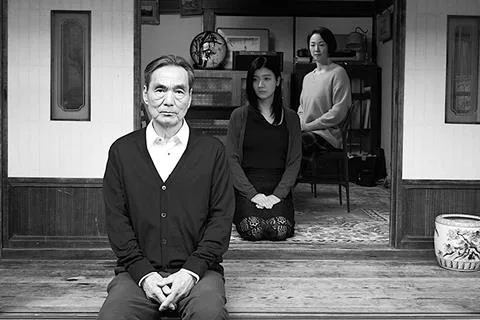Dir/scr: Yoshida Daihachi. Japan. 2024. 108mins Retired, long-widowed university professor Gisuke Watanabe (Nagatsuka Kyozo) lives an austere bu
Dir/scr: Yoshida Daihachi. Japan. 2024. 108mins
Retired, long-widowed university professor Gisuke Watanabe (Nagatsuka Kyozo) lives an austere but elegant life in the conventional Japanese house his grandfather built. One day he receives an anonymous email warning that an enemy (‘teki’ in Japanese) will approach imminently. And the troublingly realistic dreams that have begun to plague Watanabe creep into his waking hours. The latest film from Yoshida Daihachi, shot in tasteful black and white, is a work of style and real confidence, a film that starts as a restrained character study but which negotiates its gradual tone shift into something unsettling, chilling and sporadically very entertaining with aplomb.
Accompished…very effective exploration of the terror of a once-sharp mind that is no longer to be trusted
The film, based on a novel by Yasutaka Tsutsui, is the latest in a series of literary adaptations by Yoshida following Funuke Show Some Love, You Losers!, which premiered in Cannes Critic Week in 2007, high school drama The Kirishima Thing (2012) and 2014 Tokyo Film Festival competition title Pale Moon. His most recent film, The Scythian Lamb, continued Yoshida’s run of moderate success at Asian festivals. Positioned somewhere in between the unnerving chills of Natalie Erika James’ dementia horror Relic and Florian Zeller’s stylish, shapeshifting chamber piece The Father, Teki Cometh is an accomplished and very effective addition to the end-of-life sub-genre that explores the terror of a once-sharp mind that is no longer to be trusted.
At first, however, the film, which is divided into chapters according to the seasons and starts with spring, evokes the gentle rhythms and modest pleasures of the protagonist of Wim Wender’s Perfect Day. Watanabe, a revered expert in French literature, wakes, cooks himself an enviable breakfast (the choice to film in black and white is an astute one, preventing the picture from becoming distractingly foody), cleans his teeth, makes coffee from freshly ground beans, works on his manuscript or one of the sporadic articles that he contributes to a magazine run by one of his former students.
Another of his students tends his garden – he has taken it upon himself to renovate his former professor’s derelict well in the house’s courtyard. The way the lens lingers on the well, its wooden lid balanced over the precipitous drop below, leaves little doubt that it will figure in the story later on. Yet another former student, an attractive adolescent woman who flirts demurely, visits him for lunch, stirring up dormant emotions and urges in the elderly man.
It’s around this point that the dreams start: capturing lively moments of intimacy and abandon and, in one memorable sequence, the shame and delicious humiliation of a BDSM-tinged colonoscopy. And then there are the messages that start to arrive unbidden in his inbox: warnings of an enemy “from the north”, of refugees and social unrest, rumours of martial law. The specification of the “north” would generally mean Russia to the Japanese, but there’s another possibility – that the north refers to Watanabe’s body and an enemy within his failing mind. Then there are more prosaic concerns: his neighbour, even older than Watanabe and markedly less fastidious about personal hygiene, is waging a war against a female dog walker who, he claims, allows her schnauzer to defecate in front of his house every day.
Part of what makes this picture so increasingly unsettling is Yoshida’s discrete approach. The film embraces silence – in the serene stillness of the wooden house, the squawk of a crow or the tinkle of a windchime takes on a jarring quality. And the score, sparsely used but urgent and nervy, becomes paralysingly stressful. Most effective of all is Nagatsuka’s compelling performance as a character who is revealed to be flawed, unreliable, confused but also in some ways complicit – he embraces the dreams and delusions as an escape from the mundane solitude of his life.
Production company: Geek Pictures Inc
International sales: Happinet Phantom Studios [email protected]
Producers: Ozawa Yuji, Emori Toru
Cinematography: Shinomiya Hidetoshi
Production design: Tomita Mayumi
Music: Chiba Hiroki
Main cast: Nagatsuka Kyozo, Takiuchi Kumi, Kurosawa Asuka, Kawai Yuumi, Matsuo Satoru, Matsuo Takashi

COMMENTS